What exactly are poppy seeds? Where do they come from?
Poppy seeds are “oilseeds,” harvested primarily for their high oil content, and used as a spice in and on top of many popular baked goods and pastries.
Poppy seeds are from the opium plant, the same plant that is used to produce heavy duty pain relievers like morphine and codeine (1). Eating too many raw poppy seeds can even cause you to fail a drug test! (2)
How are poppy seeds typically used?
They are ubiquitous in baked goods like poppyseed muffins, cakes, bialys and bagels (ever heard of the Montreal-style poppy seed bagel!?). Unwashed poppy seeds, not the kind found on supermarket shelves, harbor the opium compounds that can induce the same chemical effects as morphine. PSA – unwashed/raw poppy seeds can be dangerous and should not be consumed!
Are poppy seeds healthy?
Poppy seeds, like other seeds and nuts, are generally a good source of plant antioxidants and nutrients like manganese and calcium. In 3.5 ounces of poppy seeds, you’ll get about 12% of your daily calcium needs and 30% of your manganese needs (3). Manganese is a trace element important for bone health and blood clotting and also facilitates the uptake of amino acids, fats, and carbs. For the general adult (non-pregnant!) population, poppy seeds are fine to consume in the small amounts we typically come across in baked products.
That said, poppy seeds are disproportionately high in omega-6 fatty acids compared with the amount of omega-3, and this imbalance has been found to lead to inflammation and ultimately cardiovascular disease (4). As such, you shouldn’t consume large amounts of poppy seed oil.
Healthy fats (like avocado or olive oil!) are extraordinarily beneficial for our health and especially crucial for fertility, pregnancy, and healing postpartum. Check out our notes on fats and omega 3-fatty acids!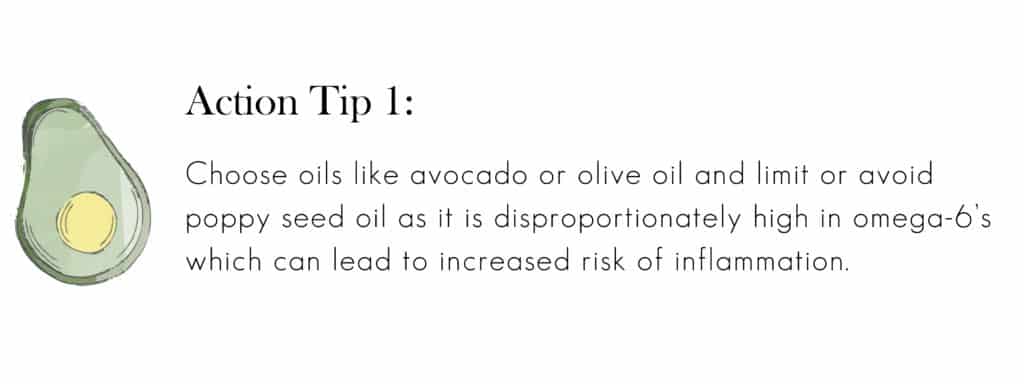 Are poppy seeds safe during pregnancy?
Are poppy seeds safe during pregnancy?
High amounts of poppy seeds could pose risks to both the mother and the baby because of their potent opium compounds (5). However, the amount of poppy seeds in foods such as bagels and muffins is super small, not raw seeds, and should be fine for consumption. Poppy seeds that are used for baking and cooking are regulated and go through a rigorous washing and procuring process to get the opiate residue off as best as possible.
Don’t forget to always ask your doctor these important questions about introducing new foods during pregnancy. Some resources suggest avoiding poppy seeds 3-4 weeks before baby arrives in the instance it shows up as opioids in blood work, this is common in the urine screenings, however, modern medicine should be able to detect the difference between poppy seed consumption and drug use.
Overall, since we don’t have much research on poppy seeds in pregnancy, it’s best to approach eating them with a little bit of caution. Daily intake of raw poppy seeds or poppy seed tea is a no-go, but baked goods and treats with poppy seeds added are okay. Additionally, avoid any poppyseed products in supplements or OTC medications, etc. 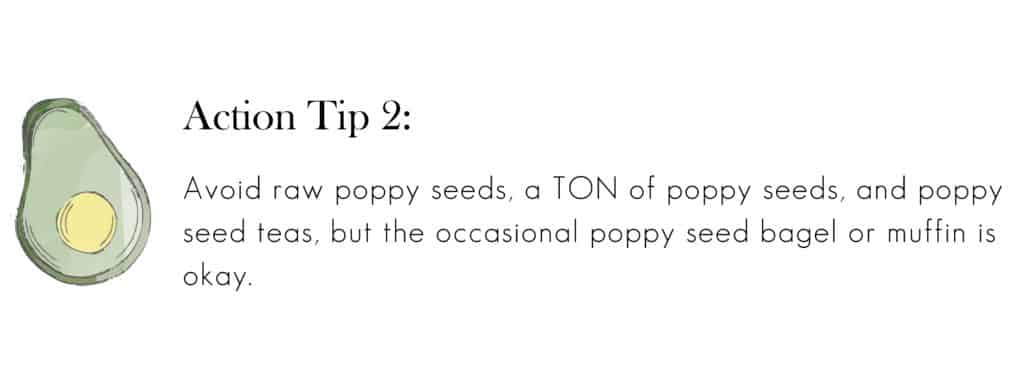
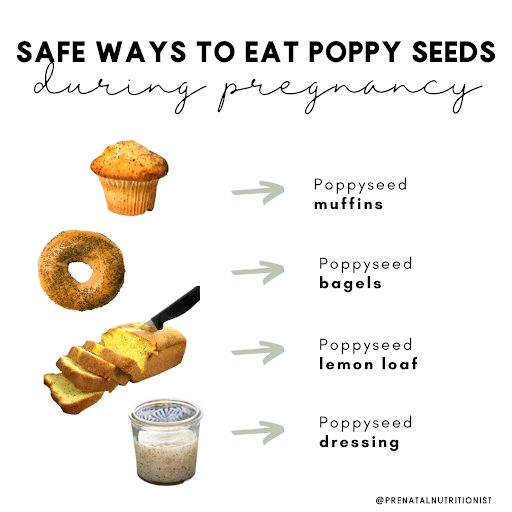
Will poppy seeds affect fertility?
All seeds have fiber, nutrients, and other plant-based compounds like antioxidants that may theoretically enhance fertility and chance of conception – but we don’t have research on poppy seeds and fertility specifically to support this (6)!
Fun fact: Age-old medical wisdom says that flushing fallopian tubes with poppy seed oil to clear excess mucus will greatly enhance conception. This ancient medical technique sounds strange, but researchers have actually replicated this in 2018 and found that the women who had their tubes flushed with poppy seed oil (not just any type of oil or liquid!), clearing the blockages that prevented eggs from implantation, were more likely to conceive successfully in the months following the procedure (7). This practice is not used widely but may be adopted by fertility specialists in the coming years!
Can poppy seeds be used in seed cycling?
Poppy seeds are not used to replace the traditional “seed cycling” seeds – flax, chia, sunflower, pumpkin. If you’re curious about seed cycling to boost fertility check out our note here.
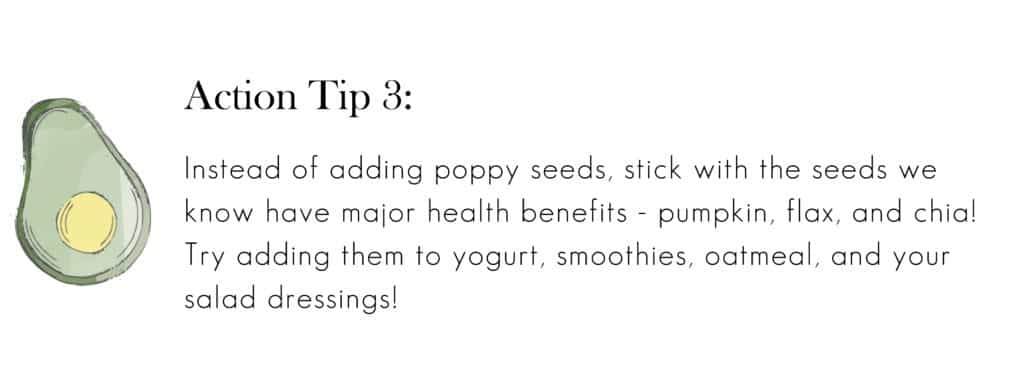
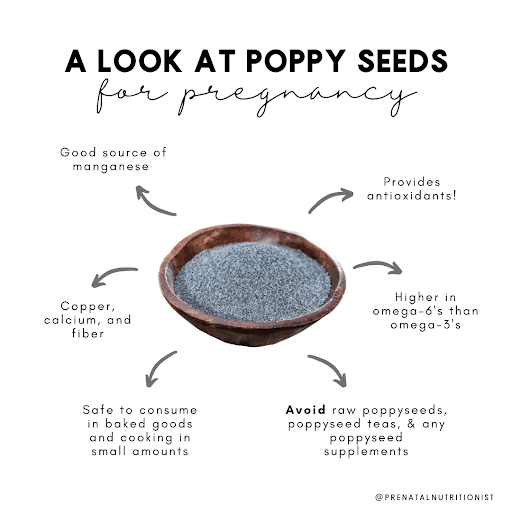
The Bottom Line
- Poppy seeds are from the opium plant, the same plant that is used to produce heavy duty pain relieving drugs like morphine and codeine.
- Poppy seeds in HIGH amounts can actually cause the same effects on your body that morphine can and because of this, consumption should be minimal during pregnancy.
- Daily intake of raw poppy seeds or poppy seed tea is a no-go, but baked goods and treats with poppy seeds added are okay.
- Overall, it’s probably smart to opt for seeds and nuts we know are health-promoting – walnuts, almonds, flax seeds, chia seeds, pumpkin seeds, sunflower seeds, etc.!
Written by: Clare Viglione, MPH, RDN
Reviewed / edited by: Ryann Kipping, MPH, RDN, Owner + Founder


